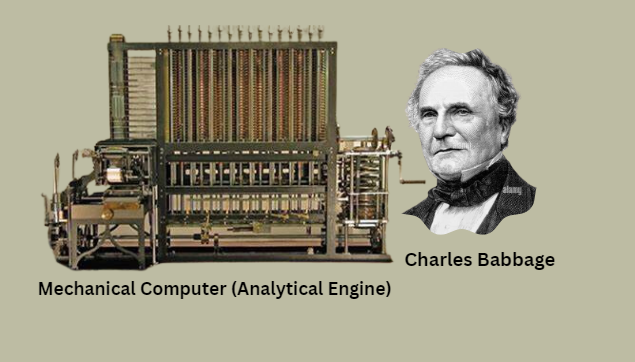Charles Babbage, often called the “Father of the Modern Computer,” was a British mathematician, philosopher, inventor, and mechanical engineer. He is widely recognized for his conceptual design of the first mechanical computer. His work laid the foundation for the computers we use today, even though the technology of his time couldn’t fully realize his visions. This article explores his contributions and explains why he earned the title “Father of the Modern Computer.
Who Was Charles Babbage?
Charles Babbage was a British mathematician, inventor, and mechanical engineer who is best known as the father of computer. He designed the first mechanical computer, called the Analytical Engine, in the 19th century. Although it was never completed in his lifetime, his ideas laid the foundation for modern computing. Babbage’s work aimed to automate mathematical calculations, which he believed would improve accuracy and efficiency. He also invented a simpler machine called the Difference Engine, designed to compute mathematical tables. Babbage’s innovative concepts significantly influenced the development of computers and technology.

The Idea of a Mechanical Computer
Charles Babbage’s idea of a mechanical computer was to create a machine that could perform complex calculations automatically. He envisioned a device called the Analytical Engine that would use gears, levers, and punch cards to input data and instructions. This machine could store information, perform mathematical operations, and even make decisions based on conditions, much like modern computers. Babbage’s design included features like a memory unit and a central processing unit (CPU), which are fundamental to today’s computers. His vision was to create a device that could store numbers, follow a set of instructions (or a program), and perform calculations without human intervention. This idea was revolutionary at the time and marked the beginning of the concept of a programmable computer.

The Difference Engine
The Difference Engine was a mechanical calculator invented by Charles Babbage in the early 19th century. It was designed to automatically compute and print mathematical tables, such as logarithms and trigonometric functions, which were crucial for navigation, science, and engineering at the time. The machine used a series of gears and wheels to perform addition and subtraction, which could then be used to calculate more complex equations through repeated operations. Although Babbage never completed the full-scale version due to technical and funding challenges, the Difference Engine was a significant step towards the development of automated computing and laid the groundwork for future advancements in computer science.
Analytical Engine
The Analytical Engine was an advanced mechanical computer designed by Charles Babbage in the 1830s. It was the first concept of a general-purpose computer, capable of performing any calculation or task if given the correct instructions. The machine included several key features found in modern computers, such as a central processing unit (CPU) for calculations, memory for storing data, and an input/output system using punched cards. The use of punched cards was an innovative idea that allowed the machine to be programmable, meaning it could follow a set of instructions provided by the user. This design allowed the Analytical Engine to be programmable, making it far more versatile than any other machine of its time. Although it was never fully built due to technical and financial constraints, Babbage’s Analytical Engine is considered a pivotal development in the history of computing.
Ada Lovelace: The First Computer Programmer
An important figure associated with the Analytical Engine is Ada Lovelace, a mathematician who worked closely with Babbage. She is often considered the first computer programmer because she wrote the first algorithm intended to be processed by a machine—Babbage’s Analytical Engine. Ada recognized the potential of the machine to do more than just calculate numbers; she envisioned it as a general-purpose computing device. Her notes on the Analytical Engine include what is considered the first computer program, a sequence of operations for the machine to follow.
Why Is Charles Babbage Called Father of Computer
Charles Babbage is often called the Father of Computer because he was the first person to conceptualize and design a machine that could perform complex calculations automatically. His ideas were far ahead of his time, and his work laid the foundation for the development of modern computers. The principles he established—such as programmability, automatic calculation, and data storage—are still used in computers today. Babbage’s vision of a mechanical computer that could perform any calculation provided the blueprint for future developments in computing.
Conclusion
In summary, Charles Babbage earned the title of the Father of the Computer due to his pioneering work on the Analytical Engine. His innovative ideas about programmability, data storage, and arithmetic operations were groundbreaking. Though his machines were never completed, Babbage’s contributions continue to influence modern computing. His legacy reminds us of the importance of visionary thinking and the lasting impact of foundational ideas in technology.
Recommended Article
- ALU Full Form in Computer: Definition, Functions, and Importance
- What Is A Computer Mouse? Features, Functions, Types, And Uses
- What Is VRAM? Everything You Need To Know About VRAM
- 32 Bit vs 64 Bit : Performance, Compatibility, and Limitations
- What Is Device Driver? Functions, Types, and Examples
- What Is Motherboard? Types Functions, Features, And Importance
- What Is Icons In Computer And Why Are They Important?
- What Is Data? Types, Usage And Importance In Computing?
- DDR3 vs DDR4: Speed, Efficiency, and Performance
- Top 20 Highest Salary Jobs : Lucrative Careers with Best Salaries - 5 April 2025
- Types of Operating System (OS): Features,Types And Uses - 5 April 2025
- 15 Features of Operating System You Should Know - 4 April 2025











